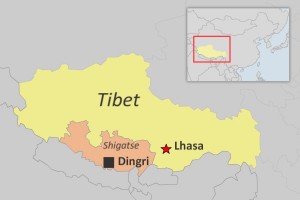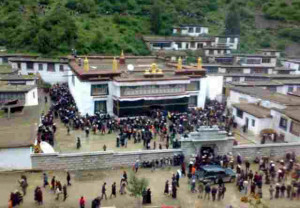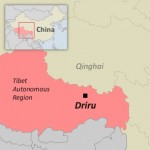Twenty six Tibetan nuns were expelled from Jhadda Nunnery in Driru county, Tibet, last month. The nunnery was targeted by Chinese authorities after nuns refused to denounce His Holiness the Dalai Lama as a “splittist” in September. News of the expulsion has only now reached the exile community due to difficulties with communications in Tibet.
The nuns were expelled as part of the government’s “patriotic education” programme, which seeks to undermine traditional religious practice in the region. The programme requires monks and nuns to register with China’s Democratic Management Committee and denounce His Holiness the Dalai Lama.
Unregistered nuns reportedly hid in nearby hills when government work-teams came to inspect the nunnery, escaping detection by Chinese authorities. However, the inspection team stayed on after one inspection and expelled the fugitive nuns upon their return from hiding.
The pleading nuns were ejected, some with uncertain prospects for the future.
“The condition of those who were expelled is said to be poor, with many now having no place to go or to pursue their studies”, said Ngawang Tharpa, a Tibetan living in India. One hundred and forty registered nuns continue to reside at the nunnery.
 More than 100 Tibetan nuns were also expelled earlier this year, from Changlo nunnery in Dingri county in the Shigatse prefecture in southwestern Tibet, near the border with Nepal. Chinese authorities sent unregistered nuns from the nunnery back to their family homes, under orders to wear lay dress. The move was aimed at nuns living at the facility without official permission, only 21 of the 200 nuns there had permission.
More than 100 Tibetan nuns were also expelled earlier this year, from Changlo nunnery in Dingri county in the Shigatse prefecture in southwestern Tibet, near the border with Nepal. Chinese authorities sent unregistered nuns from the nunnery back to their family homes, under orders to wear lay dress. The move was aimed at nuns living at the facility without official permission, only 21 of the 200 nuns there had permission.
The crackdowns come as pressure mounts on Tibet’s native religious institutions. Newly constructed places of worship have been destroyed as part of a recent “Rectification and Cleansing” campaign, while ethnic Tibetan families have been instructed to call home young monks, threatened with the withdrawal of government aid if they do not comply.
The county of Diru has long resisted the control of the Chinese government, and is one of the most tightly controlled Tibetan regions, with current restrictions on communication in the area.
The Jhadda Nunnery was originally constructed in 1488 by Dungchen Sonam Dhondup, and rebuilt in 1984 following its ruin during the Cultural Revolution. It is one of few remaining nunneries in Tibet offering Tibetan Language and Literature training to an advanced level.






 Print
Print Email
Email